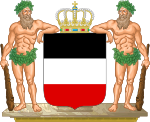Reichstag (North German Confederation)
|
Reichstag Reichstag |
|
|---|---|
| Legislative body of the North German Confederation | |
 |
|
| Type | |
| Type | |
| History | |
| Established | 1866 |
| Disbanded | 1871 |
| Succeeded by | Imperial Reichstag |
| Seats | 382 |
| Elections | |
| Direct competitive elections | |
|
Last election
|
3 March 1871 |
| Meeting place | |
 |
|
| Berlin Herrenhaus, Berlin | |
The Reichstag was the Parliament of the North German Confederation (German: Norddeutscher Bund), founded after the Austro-Prussian War of 1866. It functioned until the establishment of the German Empire in 1871. Parliamentary sessions were held in the same building as the Upper House of the Prussian Landtag, the Prussian House of Lords, located at 3 Leipziger Straße in Berlin, Germany. The same location is now the home of the German Federal Bundesrat.
After the draft 1860 Constitution of Otto von Bismarck, based on a design by Lothar Bucher, the Reichstag became the official Parliament of the North German Confederation. It was specifically designed to form a counterweight to the monarchy and special interests. While the new Reichstag was significantly weaker than other federal institutions, in the Constitution it did have significant powers. In contrast to the diets of most of the Member States of Germany, it was not elected according to a census or landholder census (German: Zensuswahlrecht), but according to progressive general, equal and secret universal suffrage for men above the age of 25.
On the basis of the new Constitution, a constituent parliament was elected on the basis of universal suffrage on 12 February 1867. The area of the North German Confederation was divided into 297 electoral districts, where an absolute majority vote directly elected a MP. If no candidate reached an absolute majority on the first ballot, a runoff between the top two candidates was conducted. Despite considerable criticism of the North German Confederation, especially in areas that Prussia had annexed in 1866, there were no boycotts of the election. Overall, the turnout of almost 65% was significantly higher than previous elections to the Prussian Landtag. The government tried to influence the elections, but nevertheless the results reflected the political mood of the population. A majority was formed by the National Liberal Party, the Progressive Party, and the liberal-conservative Free Conservatives (German: Freikonservativen). There were also some more liberal-minded MPs. Together the block constituted 180 of the 297 seats and formed a major block of potential support to Bismarck's policies. This was countered by 63 Old Conservatives, 13 Polish deputies, 18 Particularists and 19 members of the Progressive Party. The anti-Prussian democratically-oriented Saxon People's Party was represented by August Bebel and Reinold Schraps.
...
Wikipedia
